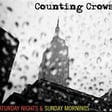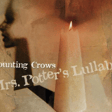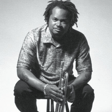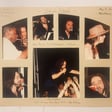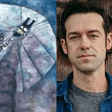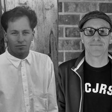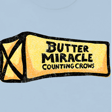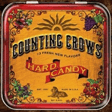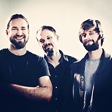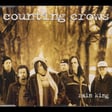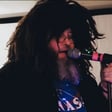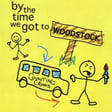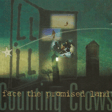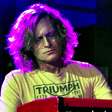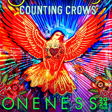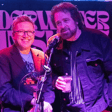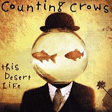Become a Creator today!Start creating today - Share your story with the world!
Start for free
00:00:00
00:00:01

E12: Matt Malley Interview
Matt Malley is one of the five founding members of Counting Crows.
He was in the band for over 15 years (from 1991 until 2005) and played on each of the first four studio albums.
Join us on this very special episode, where we had the opportunity to interview MATT MALLEY.
Matt's YouTube Page:
https://www.youtube.com/@mattmalley
Matt's Solo Record (2008) "Goddess Within"
https://www.amazon.com/Goddess-Within-Matt-Malley/dp/B001AZ89G6
Transcript
Introduction and Special Guest
00:00:15
Speaker
Welcome to episode 12 of Sullivan Street where we have a very special guest. Uh, but first I'll say hi and good afternoon to Chris. I want to say how are you, but I already know you're in a good mood because of our special guest. Am I not, you're saying I'm not special anymore, Eric? Is that what you're trying to tell me? A little bit, a little bit. I am here every time. And this person hasn't been here before and is, you know, a sort of an important person in, uh,
00:00:41
Speaker
in the thing that we have a podcast about. In the Counting Crows lore. So yeah, let's not waste any time. So our guest today is Matt Malley, as you know, probably from the podcast description, a founding band member of Counting Crows, one of the five, I believe, founding band members. So officially in the band, I think from 9105, so about 15 or 16 years.
00:01:05
Speaker
and a member of the band during their four first studio albums. So without any further, thank you so much for joining on the podcast. Good afternoon, Matt Malley. Hey, guys, good to be here. So I know we have all sorts of questions for you. Again, thank you for joining us. I don't know, Chris, did you have any kind of introduction questions or something you wanted to start off the bat with?
Joining Counting Crows
00:01:35
Speaker
Well, I figured we'd kind of start at the beginning, sort of how you sort of came to sort of be asked to be in the band. I was actually kind of curious, I know you're part of the early part, but like who was in the band already when you were asked to be a part of it? Because obviously there was Adam and there's Dave Bryson to beginning, but what's the sort of like entry point there? Yes, good question. Adam and Dave were a duo. They were an acoustic duo first.
00:02:03
Speaker
I was in a band with Dave Bryson about two years before that called Mr. Dog. And it was a great band. It was one of my favorite bands of my life, along with Counting Crows. And we fashioned ourselves after Roxy music. And anyway, Dave and I ran into each other literally on the street in Berkeley. And he said, I'm playing with a guy right now. And we're wanting to get a band together now. So why don't you come and meet him? And
00:02:31
Speaker
So Dave brought me in. Adam and I clicked immediately because we found out that we're both into British Isle Folk Rock, which is a very under the radar genre. There's bands like Fairport Convention and Steel Ice Band and Pentangle. And they're the bands that inspired Led Zeppelin at the beginning.
00:02:47
Speaker
And I've been a fanboy of that music since I was in my early 20s. And Adam knew about it. So I thought, well, I've never met anybody that actually knows these guys. And he was surprised I knew about it. And so I was in. That's how I got in. And then Adam brought in the keyboardist, Charlie Gillingham. And Dave, I believe it was Dave that brought in our first drummer, Steve Bowman. And that was the five that made that first record. Well, it's interesting when you said that you met Dave on the street
00:03:18
Speaker
But did he know you from somewhere to sit or you played bass or did you have to do some kind of Audition or something like that? No Dave already knew me because we had been in that band But it had been a couple of years since we saw each other and so I say I say right. Yeah Yeah, yeah Dave kind of knew that how I played and and just they were that was probably the luckiest week of my life because they were starting to get a band They were looking for musicians, you know
00:03:42
Speaker
And when Adam sung, I remember Adam told us as kind of a weird homework assignment, go home and pick a song that we can cover. And I brought in What's Next to the Moon by ACDC. And when Adam sung that, I thought, man, we really got a tiger by the tail here because he really was a... I thought, what a good singer. So that's how that all started.
00:04:07
Speaker
Oh, thank you at that first rehearsal or was it like three of you like kind of playing that together? Good question. No, it was the five of us that came in, I believe that first
Early Performances and Band Growth
00:04:19
Speaker
rehearsal. Yeah. Yeah. But Adam and Dave were playing around here and Mr. Jones as a duo, pretty much like they sound on the record in bars around San Francisco at that time, you know. And then when that band formed, it happened pretty fast. There was a moment I remember
00:04:37
Speaker
We were, you know how being in a band is like you go to your sound check in the afternoon and you all go get a burrito in somewhere. You're in San Francisco at a club. And we came back after our burritos and saw a line going around the block and thought that was some club next door where somebody else was playing. And they found out it was for us. And so that was a shock. That was the first shock, you know. And it's San Francisco, so the burritos are excellent, right? Oh, yeah.
00:05:03
Speaker
You know it. Yes, they are. I don't think I realized it was all just sort of like one moment of like, okay, we're going from like two to five in just like kind of a snap of a finger. But again, that ended up being the five that made the record. Yes, that was the five. And with David McGinn guessing actually on that first record. But that was the core five. And but there was a moment that was miraculous. And maybe you guys already have covered this topic. But
00:05:31
Speaker
There was a thing called the Gavin Convention where nine major labels came to the Bay Area. They were looking for talent. And we were already abuzz in the Bay Area and they had our demo tape and some people knew about it. So most of the labels came to Sea Count and Crows. And we played, it was called, oh, I forget the name of the club, the Eyebeam, I think. And it was the nine labels, including
00:05:54
Speaker
the and of A&M. His name was Andy. I forget his last name. But nine major labels came to CSM. The next morning, nine labels offered us a record deal. And that was... I did hear about that part. I didn't know about the convention or anything like that. You know, it's funny going back into... was there a re...
00:06:14
Speaker
you said you were from, you told me you were from originally from that area, but what were you, can I ask what you were doing at the time? Were you looking to like for a band to be your career?
00:06:29
Speaker
Good question.
Career Turning Points
00:06:31
Speaker
I just turned 27 and I was still living with my parents. I'm not ashamed to admit and trying to move out here and there, renting a bedroom in someone's house and then back to my parents' house because I failed again. I was ready to give up. Counting Crows happened right when I was giving up. I was signed up to go to Oklahoma City to become an air traffic controller. I loved airplanes and I still love airplanes.
00:06:58
Speaker
And I even sold my basses. I don't think I owned a bass. In fact, I can tell you, I didn't own a bass guitar. I had to borrow Dave Larson's bass to go meet the band. And I was giving up. I was literally giving up. And then everything ignited. It's kind of amazing just walking down the street and
00:07:19
Speaker
Damn, like had you just had you not looked up and seen Dave? Who knows? That's amazing. Yes, I know. I know. I know. Gosh, exactly. The way that the things that life can do. Yeah. Yeah. One other just like pre-Crows moment I wanted to ask about and it's actually particularly because you play the bass.
00:07:40
Speaker
And I guess I can go through, I think I looked at the credits of the albums and on the first album you were also credited for some other guitar, but obviously you were known as the bass player, electric bass, double bass. And then my question is sometimes with bass players is actually how did you get into playing bass? Because that's sometimes the instrument that people don't think of right away, right? When you're a kid, oh, I'm going to learn to play the guitar. They don't necessarily pick up the bass right away.
00:08:02
Speaker
Yes. Yes. Bass is a background instrument. It's an accompanying instrument. And in reality, it's the bridge between the drums and the rest of the band. It's the part rhythm and part melody. But I was the summer before freshman year of high school, my old best friend, Mike, his dad bought a guitar and a bass from Sears or Montgomery wards and brought them home. They were like 20 bucks each. And Mike knew how to play a G on guitar. And so I was the bass player. So I played the bass.
00:08:31
Speaker
And we learned, we taught ourselves down on the corner by Creedence Clearwater Revival and it's that when the guitar and bass go boom, boom, boom, boom, boom, boom, boom. And we did, we played it and we were shocked that we sounded just like the record. So I was a bass player for life at that moment.
00:08:48
Speaker
So, but you're right. It's an instrument that unless you're Victor Wooten or Stanley Clark, it's an instrument that has to be with an ensemble to help the ensemble sound better. And that's the role of a bass. Can I ask, you know, what of your bass playing influences
00:09:09
Speaker
were you kind of like thinking towards when you started playing Counting Crows? Like were you thinking about those like Fairport Convention baselines or was there like kind of what was inspiring you from your end?
00:09:19
Speaker
bringing that to the songs? Good question because the inspirations bleed through no matter what you do and since it was the we were still a product of the late 80s and it was 1990 actually when I first got in with everybody when they put the first band together like late I think the fall of 90 so our early demos sound like REM there are a little more polish and a lot of reverb on the guitars and things and
00:09:45
Speaker
It sounds like the late 80s, if you heard the demos. Yeah, like good late 80s music, but very late 80s music. Yes, yes, good. And right, the cusp of the 90s music. And it was T-Bone Burnett, our first producer, that broke us down and said, Matt, I want you to get rid of your fretless bass, although I played it on Mr. Jones and a couple other things.
00:10:06
Speaker
But I want you to buy a vintage bass over there on Sunset Boulevard and see if it has original strings from the 1960s. And that's the bass I want you to play on this record. And the way he described that made me think of playing differently. I know what
First Album and Songwriting Insights
00:10:19
Speaker
he was saying, and that was to play like Fairport Convention, play like Van Morrison's bass player.
00:10:28
Speaker
you know, like think of where every note is important, not the tone as much or the, like with a fretless bass, you kind of make it sing and swim. And I just thought of bass playing differently. He made me a songwriter's bass player, T-Bone Burnett.
00:10:45
Speaker
So that 70s sort of songwriter-y vibe was kind of, yeah. Can I ask, was that the bass you played on the first tour? Because I was noticing there was a really interesting looking bass you were playing. I was watching like an old show from like Rome 94 yesterday. And there's like a cymbal on, and I was curious what that cymbal was. And I thought maybe it was a custom thing, but maybe it was just the bass you found on Sunset.
00:11:09
Speaker
No, I know the exact one you're talking about. No, that was one of my more high-tech basses. That was a fretless music man Stingray. And it's a sticker. I still have that bass. And the sticker is called a Shri Chakra. And it's a symbol. I don't know exactly what the history of a Shri Chakra is, but I just really love the way it looked. So I put it on.
00:11:30
Speaker
It did look very cool. Yeah, thanks. I was picking through things. It was awesome. Chris, when he was talking about the producer, did you have, because I saw some of your pre-questions, did you have any other questions related to the making of the first album? Because he was kind of touching on that.
00:11:45
Speaker
Yeah, no. Tell us maybe a little bit about that process of making the first record. You guys went into a house, but I'm always curious. There's got to be a lot of fun stories from living in a house with everyone together. Yes, it was awesome. We went to this house in LA. We're all from the Bay Area, living in the Bay Area. We're just driving down to LA road trip, and we're living in this sort of McMansion in the Hollywood Hills. Had an elevator, so we had to play with the elevator.
00:12:15
Speaker
And the making of that record made musicians out of all of us, and it was the producer that did it, T-Bone Burnett. He said, your demo sounds like a record. Now we're going to make a record that sounds like a demo. And he stripped down the reverb. He took away all the effects. He made me play an older bass.
00:12:30
Speaker
And that record, that first record, I'm so proud of that record because it has a silence to it. Like the beginning of the first song around here on August and everything after, it comes out of silence and fades in. And the whole record has a silence. And I'm really thrilled with the way T-Bone provided like a flagpole and had us all point to that pole.
00:12:53
Speaker
and say here's what we're gonna sound like here's what we're gonna do he also told me there should be no ordinary moments on a record there's there was for example the chorus of a murder of one is eighth notes on bass it's just bum bum bum bum bum bum and i played it and t-bone said it sounds good but make that the only time you do that on this record you don't want to just start doing eighth notes and not making things that's cool
00:13:16
Speaker
Yeah, yeah. And he's right. And because he said that, that's what I did. I didn't do eighth notes anywhere else, you know? So that record's a special record. That's actually a really interesting way to think about the like, no, because there kind of aren't any ordinary moments on that record. It's sort of just, I don't know, because we've done, part of our podcast, we've kind of done sort of discussions of at least the first two records. We're going to do all of them eventually. But
00:13:42
Speaker
It's such a hard record to sort of break down because all of the songs are so specific and kind of special in their own way. And I think that kind of comes back to it and there's no ordinary moments. There's no like, ah, that one's just kind of like flat and it kind of goes through. All of them have these special unique things about the songs. Yes, right.
00:14:03
Speaker
So it's interesting you mentioned Murder of One because I believe, and I'll bring up some other ones, I went through and tried to, part was my memory, but then I went through the albums and I tried to designate or note what songs you actually got co-writing credit for. And I think Murder of One was one of those. Yes. One thing I've never asked a professional musician who's published work is
00:14:27
Speaker
What's the threshold sometimes to getting writing credit? Because obviously on other songs, you're contributing or adding your little flair. I mean, it's not like Adam is writing every note of every instrument. So what what sometimes makes that threshold like, you know, and what did you bring to murder of one, for instance? Yes, very good. Well, I think there are at least three different publishing separations. One is mechanical royalties. And I'm not by no means an expert. I'm just a lucky fool who plays bass.
00:14:56
Speaker
But I know that the way Adam ran things, and a lot of bands do this, we were recommended this by our people around us, that if somebody's in the room while he's composing, whether or not we even
00:15:08
Speaker
Make a suggestion that he accepts will get a songwriting credit on that because we might have said something that made him think of a chord So it's very generous in that way and I know murderer one though. I actually helped write chords You know, it was Adam and Dave Bryson and I that just went down to Dave's studio and up in Oakland and
00:15:27
Speaker
and just wrote that one afternoon. So that was more hands-on. You get in on publishing by being the player on that song. So since I play based on those songs, I get a publishing credit and income and whatever.
00:15:41
Speaker
And I don't know there's a there's another one. But anyway, I said, I'm a lucky fool. Yeah, it's interesting I maybe as we go along there's some songs I'll either mention that you either had writing credit for and you can mention something or some particularly memorable and then or you could add your own I I know that in ghost train I find that there is a some memorable bass bass bass lines in there. Yeah. Yeah, that's a fretless bass That's that swimming sound that I really love and so people let me play that on that one and also mr. Jones is a fretless bass and
00:16:12
Speaker
But yeah, Ghost Train is a really beautiful song and we're all fans of Adam. Adam would come and bang out something on the piano and you could hear the whole band in his piano. He's a songwriter like Burt Bacharach or something. And he's one of those guys that once a week he just lays a golden egg and we all have to figure out how to play it.
00:16:37
Speaker
The songwriter is something that you're born to do. The reason bands don't last is because they don't have a real songwriter in them necessarily. There's many ways for bands to break up.
00:16:51
Speaker
You can tell that bands that started to age over time, their songs got more mediocre. And I don't see that happening with Adam and the guys. He's getting just in a way deeper and more ill, which I admire. I mean, without being an ill person, his songs are just more troubled, which I admire in the modern Counting Crows catalog.
00:17:14
Speaker
Well, you know, one thing I was going to say when I introduced you was that it's part of the aging process,
Recording and Recognition
00:17:21
Speaker
right? It's actually some things that I studied that if you look at officially, it's kind of crows are are, I don't know, 3233 years old. Now we're at a point that
00:17:29
Speaker
wow, if you're in the band 15 years, that's less than half of the years of existence. But that said, first of all, it's 15 years, it's still a long time. It depends how you count the covers album and they have an EP and stuff, but I guess at the very least, there's six studio albums, but you were there for four of those, four of those six. I guess they're most popular for, I guess, by sales, you could argue.
00:17:58
Speaker
And so that's why we have so much to talk about. So the first house on the hill was in the Bay Area. And that's what I was going to say. I think also the only four albums that they recorded in houses. I think after you were no longer with the band, they recorded not in houses anymore.
00:18:15
Speaker
I think so. Yeah, they went to studios. Yeah. Yeah. Were the other three in the LA area? The other three houses? Yeah. In fact, all of them were in LA. I think the house that Adam might have referred to up in Berkeley was where we rehearsed and founded our band. That's on, there's a famous land run down on Virginia and La Loma, which is in Ghost Train, I think. And that's an intersection in Northburg. That's where the house was.
00:18:37
Speaker
Okay. And so yeah, we all we did them all in houses that people Burnett got us onto that because he said that recording studios reek of despair. Yeah, let's rent a house, you know, and each house was different, right? Each each of the four houses was different. So yeah,
00:18:55
Speaker
The houses might have some character. Yeah, they had to have some character. The second record we did, Recovering the Satellites, was done in an awesome house. It was like a giant version of a California craftsman house. I don't know the architect, but it's somebody big. It was a beautiful house. MTV did a thing on us there where they interviewed us in that house.
00:19:17
Speaker
and that you can see a lot of it and that was awesome. I've seen clips on that and maybe Chris can say there's rumors that that recording of that will be released sometime in the future, Matt. I've heard about HBO possibly doing a documentary. I wasn't even aware of that until I listened to your podcast. Yeah, at least because it's beautiful. It's interesting because of that footage, I feel like whenever I think about the band recording, I think about
00:19:45
Speaker
that because there was so much. I don't feel like I don't think there was video of any of the other three. I think it's a lot of recovering the satellites video when I think of the band in a house knocking out a record. Yes, I don't remember any video being shot in any of the other houses or at least not much at all. You know, God, imagine now if those records were done with iPhones, everyone's got an iPhone. It would have been awesome. Everyone on YouTube. Yes.
00:20:16
Speaker
You know, one thing I would ask about the early days or even now, obviously, like, when you're on a... Oh, and one thing I didn't mention to you, actually, is I did... Well, now I'm only talking you through a computer screen. But I actually did meet you once for 60 seconds. It was at, I think it was the premiere, actually, but when you did the World Cafe in Philadelphia for the Hard Candy release. And you did, like, four songs in the, I think it was Tower Records.
00:20:43
Speaker
I was not able to attend that because I think it was only a couple hundred fans and I wasn't there early enough. But after that, if you bought a copy, you could wait in line to have it signed. And I met you there. And then I also loitered around a bit and then the band actually came. And I mean, it just it also reminds me of what Adam would talk because Adam was a music lover. You guys are all music lovers. But after the CD signing,
00:21:07
Speaker
A few of you went and shopped for CDs and you were hanging around just looking at music because you would like music. So you, I don't think I said, or maybe I just waved at them or said hi, but I didn't actually talk to them, but you and Dave, I actually went and talked to. So anyway, I remember you being very approachable and you answered a few of my questions and then I just didn't want to bother you anymore and I went on my way.
00:21:30
Speaker
I'm happy my reputation is intact and I was polite. Obviously an event like that where fans went or at a concert, I know, especially back then, I think it was after the concerts, the bands would meet the fans. But given how popular Counting Crows was,
00:21:49
Speaker
When you were not on tour or where you were back at home in your real life Did you and even maybe years after you left do did people you know recognize you as being the bass player of counting curves? No, no, no, you know, I changed I gained some weight I gained My hair went gray. I got a haircut. I didn't look like I did in the you know when I turned I think 42 43 I
00:22:13
Speaker
I just started to morph, you know, so I wasn't the same. I just didn't look the same. You know, I did get recognized in the 90s, you know, the mid 90s. And I was always thrilled. I was also a very awkward celebrity to talk to Counting Crows fans. I was kind of hyper and embarrassed that they recognized me. And I'm kind of an introvert, I guess, you know. And I had to learn how to kind of be cool, like to teenagers.
00:22:40
Speaker
They were big fans. I got to kind of act like Counting Crow's bass player. I'm happy to meet you, not bum them out, you know, being a geek, you know. But it's funny you said that because I do think that most, I don't want to say most celebrity, because it depends what you're famous for, but things like music and movies and I guess even sports and I'm thinking other parts of popular American culture, it usually happens between age, you know, 18 and 35.
00:23:05
Speaker
so and that's certainly usually where the height of the popularity is no matter what your craft i mean there's some you know rare examples maybe tom cruise became you know it's more even more popular in his 40s or something but it is weird though because then
00:23:18
Speaker
people then look back at your 50 or whatever, and then you look back. So not only was that an exciting time, and probably it was all a blur, but it's also a time when you're still kind of finding yourself in some ways. So I don't know. Do you think back a lot about that or just things you might have done differently? And does it necessarily even have to do with the actual music or the band? Do you have any thoughts on that?
00:23:46
Speaker
Yeah. No, good question. I mean, I got married at 33 and that was right after we recorded recovering the satellites. And I look at marriages the beginning of the second half of my life, you know, it was Art Garfunkel that said, the birth of your first child is the first day of the second half of your life. And in a way, getting married to me was that it was like now I have a person who's
00:24:13
Speaker
who's at home and they're thinking about me. And I like to get back to them. When kids came, it got a lot harder, a lot worse. I'm missing out on stuff. And I hung on as long as I could. But I felt like childhood ended when I got married. And so I was a 33-year-old child.
00:24:34
Speaker
Well, you know, in some ways that fit maybe not for most musicians, but that fits, you know, some people that try to easily like look at the life course and look at a at like clear mathematical, you know, they would some people call a young adult 20 to 35. Right. And then the 35 to 50 would be kind of middle age or old or, you know, middle. So you time that perfectly. Right. 20 to 35. And then, you know, it was an accident. Chris, did you have a next question?
00:25:02
Speaker
Well, sure. I'd love to. I'd love to talk
Live Shows and Improvisation
00:25:04
Speaker
about. So obviously the band made a lot of amazing records, but a lot of the reputation of the band is how incredible y'all were live for so long, continue to be. And there's something.
00:25:18
Speaker
Obviously, the band has this sort of sui generis way of improvising, right? The sort of what fans, I guess, called alts, right? But that thing of sort of following a direction in the middle of songs, specifically a lot of times, you know, like Murder of One and Round Here.
00:25:35
Speaker
and I was curious about sort of the development of that like there's the there's the big story of Adam going like we're not going to play this the same way every night to just kind of follow me on this but you know kind of what was that like because you're kind of following and
00:25:51
Speaker
kind of playing a new song in this old like I'm just kind of curious from your perspective what it was like to figure out how to do those things because by the end of the first tour there's these you know 11 minute versions of round here and 15 minutes of murder of one and you guys are just flying the whole way through you know right yes I remember Adam early on
00:26:14
Speaker
But it started to scat and improvise on the songs in the middle sections. And I remember early on, a lot of people kind of wouldn't listen to him or they'd kind of play their part. And he had to scold the band in those early days to go with him. And so it was something that was just trial and error over years that we all got better with over time.
00:26:39
Speaker
and because he's really good at improv. Adam's a really good musician. He's not just a great songwriter, but he like, for example, the solo to Long December is Dan. It's a three note solo just Dan. Adam sung that to Dan because Dan was having trouble trying to come up with a solo and Adam just went and sung it and played their guitar. So Dan taught himself that and that's the solo of a Long December. So Adam Adams without without being
00:27:09
Speaker
academic or ever going to school, he's a really natural musician and knows how to improvise over things with his voice. And so we had to all kind of rise up to that level, you know, and not, at least not disappoint him. You know, when he goes off a cliff, he wants us to catch him, you know.
00:27:30
Speaker
It was probably a fun challenge too, right? Yeah. Maybe to keep you on your toes a little bit during the show, right? Yeah. Instead of just playing the same way. Yeah. Oh yeah, definitely. The band is a very bored band because
00:27:44
Speaker
I remember in the 90s Adam would often avoid playing Mr. Jones just because he was so pissed off having to play Mr. Jones so many times. And so to try to break out of that box, touring is a lot like being in prison. You just have to do the same thing every day. You resort to lifting weights in the hotel.
00:28:02
Speaker
You have to just do the same things. So the band started to really, Adam leading us, started to try to reinvent our tours, to start from going crazy. Rock music by nature is built on parts. You learn, you play a bass part and you just repeat that stupid bass part. And we tried to avoid that at every corner. Stop playing parts.
00:28:30
Speaker
Yeah, no, I always I get that. As I said, I that's why I emphasize with with either comedians or as I said, even a teacher, even if I know like what joke or what thing the students love to hear every time going through it every time the same way, you just feel like that. Yeah, you want to change it up a little bit. Yeah. And keep yourself motivated. Those improvisations that are memorable to you or that you did a lot where you were like, I loved every time we did this and round here. Murder of one or
00:28:58
Speaker
Yeah, Murder of One, you just said it. I remember the Murder of One was kind of magical because it was such an explosive chorus. And I remember being in Scotland, I think it was Glasgow. And in Scotland, the gigs are really wild because I guess the people are really drunk or something, but they love their rock and roll and they start stomping and the whole venue is like shaking from the stomping. And I remember watching that audience lift up
00:29:26
Speaker
uh, on the outro chorus of murder one because of a long buildup and all the, the, the suspense and Adam just launched us into that outro course and the place erupted in it. That was a magical moment. You know, I can't tell you what year exactly. Maybe it was around the mid nineties, you know? Yeah. RTA recovering the satellites, you think, or I'm curious to go back and try to find this now. Good question. I think it was after recovering the satellites was out. So we were touring that record.
00:29:56
Speaker
And yeah, yeah. So no, maybe before, it was probably like 95. Could have been 94. Okay. Yeah. As someone that just saw a couple of shows, a kind of grows in England last year for the first time, it's still like that. The crowd, the crowds are so much more enthusiastic. And I don't think it's, it's, it's just the alcohol because a lot of Americans get drunk at those crochets. But they also were playing with their phone and talking to people next to them. It's just that over in the UK, they get more into it and they,
00:30:26
Speaker
Yeah, I'm not surprised at that. And they kind of know when the magic part, they get into, they know when the magic parts are and show their approval of those parts. So it's still that way. We're kind of related to Chris's question.
00:30:40
Speaker
Were there two or three songs that you love playing live? Now, it might have been because you love the song or just maybe you didn't play it enough. So when you did or it was just, yeah, was there any that you love to see on the set list? Gosh, good question. You know, I think of our our heyday of the first two albums and the tour of the first two albums. And after that, we started to get a little older. We started getting into our middle age, you could say after 35. I think we
00:31:08
Speaker
That's kind of a different era of counting crows to me. So after like 99 I'm right around 99 and so I
00:31:17
Speaker
Before that, those first two records are just loaded with great songs, and in my personal opinion, the ones that I was on after recovering the satellites, they have jewels on them, like real gems, but not every moment is magical, like those first two records. And so, like there's a song, St. Robinson and his Cadillac Dream, that's a magical song to me. There's a few, there's one that's like Burt Bacharach,
00:31:45
Speaker
thought I might get a rocket ride. Oh, all my friends. Oh, my friends. Yeah. Yes. Yes. Yes. See, you guys are fans. All my friends. Yes. So give us a prompt, you know. Yes. Yes. That's that's a magical song. You know, that that's like that's the level of of to me, Burt Bacharach or Jimmy Webb, you know. And they're a little more rare after the second record, in my opinion, you know,
00:32:13
Speaker
I'm sorry, what was your original question? It was just that there was a certain song. And by the way, those two, I think those two were always great live. So this could have been St. Robert, but I think was there like two or three songs that you when you saw it on the set list, you're like, oh, great, I love playing this song live. Yes, those two are good examples of if it was from the first couple of records, anything. Okay. Yes, I love Anna Begins. I love playing Anna Begins.
00:32:36
Speaker
because the chorus was such a release. It goes to a major feel, and Dave Bryson's guitar is so beautiful. And I love that playing Anna Begins Live. I love playing Omaha Live. There was a moment actually, after we made the record,
00:32:53
Speaker
A record is like going into a microscope. You're going into this thing in all your little parts. So all of us went through that. And our first rehearsal after the record, we went back up to the little house in North Berkeley, and we all played Omaha. And we were laughing because we sounded just like the record. We couldn't believe it. It's because everyone knew their parts so well. Anna begins as an interesting one because that's one that, of course, the sound changed, the live version.
00:33:23
Speaker
Yeah right it was a little harder i guess a little more guitar e yeah. But you obviously still love playing it alive i think the both versions are great so yeah yeah true you know no i will add on
Acoustic Influences and Challenges
00:33:38
Speaker
the big.
00:33:38
Speaker
Adam and Dave Emerglick and I were all fanatics of a fellow named Richard Thompson. Have you ever heard of Richard Thompson? He's under the radar. Of course, he co-founded Fairport Convention with his first members and he went on to become a solo artist. And he has two incarnations. One of them is solo acoustic and the other is with an electric band. And they're always awesome because he's such a great musician.
00:34:04
Speaker
And Adam would kind of, Adam mirrored Richard a little bit in having acoustic sets and quieter songs mixed with more raucous versions, you know. I'm actually curious, how did you like doing the, sort of skipping ahead and Chris go back to the recovering the satellites recording, but you know, doing
00:34:23
Speaker
the prep and doing all those acoustic sets to do MTV story, sorry, VH1 storytellers. Like, did you like that process of like rearranging all the songs to be acoustic or was that interesting or fun? I enjoyed it. Not everyone was happy about that. Our drummer, Steve, was a very rock and roll drummer and he didn't like acoustic feeling things, which all of us kind of argued with him over. And and also what Adam told the guys in the band, there were a couple of them that had trouble
00:34:53
Speaker
kind of reinventing their parts on their instruments for an acoustic feel, they just played the same parts on an acoustic instrument. And Adam had to explain, don't just unplug and play what you play, try to get into this new feel. And it involves having really good antenna as a musician to reinvent a song like that.
00:35:19
Speaker
Yeah. Was there one of those rearrangements that you really liked of those acoustic songs where you were like, Oh, this acoustic version is like, is great. Good question. Um, I mean, I saw Anna, I think of Anna begins immediately when you say that acoustic version, but it's very similar to the electric just quiet or the, I mean, there's not a lot of re
00:35:42
Speaker
There wasn't like a full reinventing into the acoustic sets. What do you think, Chris? Now I'm just, I should have prepared for that question. I almost think Matt's work in Angels of the Silences stands out for the acoustic version. I don't know if you remember how much you remember that, Matt. Yeah, I agree there. Yeah, yeah. Well, no, I don't remember a whole lot on Angels of the Silence. I probably played an acoustic bass on that. Yeah. Yes, I never did upright on that, I don't think, unless you found something. Yeah, I could.
00:36:11
Speaker
Yeah, it's Angel of the Silences. It was kind of a punk song. Charlie came up with the music to that, and Adam sung the song over it. And it was a high energy song, so acoustic version of that was pretty cool. But I don't have strong memories of it. For some reason, the bass sticks out with me again, just from a memory. Now, some of this is going to be random, just to tie off what you did before. Like when you mentioned this desert life, you're saying in kind of off the cuff that Satan Robinson and all my friends, and actually those might be my two favorite songs.
00:36:41
Speaker
or I think they're also the most special. But interestingly, you have writing credit to a song on Desert Life that is one of the fan's favorites that we Chris and I try to figure out. We think it's the longest drought where it hasn't been played, but maybe it'll come back soon, which is actually Amy hit Amy hit the atmosphere. Oh, that's a great so that's one of those gyms. Yeah, yeah, I played upright bass on that one. And that's a great song. You know,
00:37:07
Speaker
Yeah, I don't know why they're not playing it live. Hopefully it might come back. Sometimes I think, you know, that he'll remember it or someone will mention it. Yeah. But we think that hasn't been played since actually the original when the album was released that tour, the original tour. Wow. Wow. I wonder why Adam probably doesn't like it. You know, I don't know. Don't know why. Or maybe just just forgot it or whatever. Yeah. Yeah. Chris, did you did you have
00:37:37
Speaker
I mean, I have sorts of all sorts of all sorts of questions, but I mean, one thing. Sorry, go ahead. No, I was just going to bet this about the one last thing about the house on the hill. And I think you even mentioned in another interview when the second three houses on the hill or whatever were all in the L.A. area. I know that you could go home and sleep there. But did you ever sleep actually sometimes also in the recording house? Yes. The let's see the the first record. I wasn't married yet. I wasn't living in L.A. the second.
00:38:07
Speaker
one recovering the satellites. I also was living in that house. So I live in the first two houses. Okay. And in the third one, I had a home and a family and a wife at home.
00:38:17
Speaker
Not a family yet, or not kids yet. And so, I did sleep there if I was sleep deprived. There was a nap room, you know. There was some strange things happen in that house. Honestly, I can't tell you, what was the record that we made after recovering the satellites? I can't, it's strange. That's what I was there, sorry. Okay, Dead or Light? And then Hard Candy, number four, yeah. And number four, thank you.
00:38:42
Speaker
So I remember making that record had some incredible coincidences. Charlie, our keyboardist is very scientific. He's a fan of science and statistics and even astronomy. And we had to figure out the chances of this happening. I was going to buy a bass guitar that's called a Paisley bass.
Opening for Legends
00:39:01
Speaker
It's made in the late 60s. It's a vintage bass, Fender Paisley bass, because it has a Paisley, a pink Paisley finish on it.
00:39:10
Speaker
I didn't know if I was, whether to buy it or not. And then Bill Thompson, who passed away, he was our tech guy. He did all the guitars with us on all the records, or the second one on. And I was taking a nap in that nap room. And Bill came and said, there's a guy calling from a guitar shop about this Paisley bass. So I went out into the hallway and there's a, what's it called? A grandfather or a clock.
00:39:37
Speaker
big clocks grandfather clock. And on the face it says Matt Paisley. And so I'm calling picking up the phone right near this clock that the I guess the brand of the clock was Matt Paisley. And I was so freaked out about that. And I went down and the band's like laughing and going, Why do you worry about this stuff? But me and Charlie got together because I was saying it's really an unusual quiz and Charlie had a number
00:40:01
Speaker
and it was big of how that could not have happened. Those are the kind of things we'd go through. Did you get the bass? Yes, I bought the bass, yes. Did you end up using it for a while? Was it meant to be? Yes, it was meant to be. In fact, when we did some shows with The Who and I played my Paisley bass opening for The Who, I'm happy to say.
00:40:25
Speaker
That's actually one thing I wanted to ask about. What was it like, any stories from opening for The Stones and The Who and playing some of those bigger shows with that? Because obviously with The Stones, it was like actual stadiums, right? It was like giant stadiums. Yeah, they were. That was on our first record, actually. We did 10 or 12 shows with The Stones on their
00:40:45
Speaker
voodoo lounge tour. And I remember sound checking in the arenas and they would say, okay, give me some bass guitar. This is in the afternoon when they're trying to get all the mic lines levels and the volumes. And I'd play a bass note and 80,000 chairs are pointing at me, empty chairs that are acting like little mirrors. And I would hear my bass come back a couple of seconds later. And it was the weirdest effect and standing on a stage of a stadium.
00:41:14
Speaker
and doing that and opening for the Stones, including a show we did later in Vienna back in 03.
00:41:22
Speaker
The way the weather, like a storm would come and then it would clear up, it felt like God was there with you to do your show. Because there's so many people gathered in one place and the stones were magnificent. But I was more excited about opening for The Who, because I'm a Who fanatic. But opening for the stones on those shows made me a Stones fan.
00:41:49
Speaker
But I'll tell you, opening for The Who was even more exciting for me, because I love The Who. Did you get to meet those guys? Yeah. Yeah, we met them briefly. They're very aloof, but they're very polite. Emory Gluck and I were standing at the stage door before they were going on. And Pete Townsend and Roger Daltrey just kind of walked over to us and just sat there. And Pete Townsend just leaned on a road case and looked at us both. And he's there with his beautiful giant nose. And he's looking at me and Dave.
00:42:16
Speaker
And we just said hi, and they shook our hands and just walked on stage and started their show. And that was like a couple of gods, you know, it was awesome. I mean, it is funny how that turned, right? Because to me, I'd rather meet you, right? And then Pete Towson, but that's just because I'm a cruise fan. So I know that they've had, I know that they're legends, but
00:42:38
Speaker
Just given your personality, I know you joked you were kind of shy and reclusive as a teenager, which I think a lot of people are. But I noticed on some of the, and I don't watch as many of the, Chris is our live expert, but I have seen some of the earlier live shows
00:42:54
Speaker
And it was interesting that you and Dave, because of the makeup of the band, were asked to be more front and center, you know, even with some, you know, to get the crowd going or to show off a little bit the guitar. And then later, you know, of course, as Emmy and Dan were there, you know, maybe you were more in the back and not as many as those front and center guitar solos. Personality-wise, which did you prefer? I mean, it was probably fun to experience both.
00:43:23
Speaker
Do you have any comment on that? You mean the pressure of having to act like I'm a rock star or something? Yeah, that kind of thing. It kind of made me laugh a little bit. Yes. Because later, of course, you were back with Charlie and the drummer in the back. Yes. I was happy to go back there because it was so cringy to me. I felt fat my whole life. I'm kind of fat now.
00:43:47
Speaker
But I wasn't really fat then. I've always been a little bit fat. I've never been really skinny. But I've always been very self-conscious of my body image. And to go, I was told, Adam said, you know, look like you're into it, you know, especially on my solo of Children in Bloom. There's a moment. Like, go stand in front of the stage, put your foot on the monitor and be a rock star.
00:44:06
Speaker
and uh and i did it but every time i hated it i really hated it i think you did it well and that's but that's why i asked the question is because my instinct and i feel the same about dave too uh i'd love to ask him about it at some point because obviously he was the only guitar player in the beginning and then also had a lot more
00:44:22
Speaker
And then the current tour they joked about that because was it Dan was out for a little bit sick So Dave had a kind of quote-unquote B lead guitar a little bit but I just in my impression as a fan watching for all these decades is that You and Dan didn't mind, you know doing that in the front, but it's not as much of your personality So you were more than happy to just kind of hang out and do your part in the back too. Yes. Yeah. Yeah in fact when I
00:44:47
Speaker
Emerick looked joined and now we become like a way bigger band. I was very happy to have my own riser back there with the drums and just play with Ben and Jim Bojos and Charlie on my left and I was right at home there. I was at peace I could just play bass and try to look cool, you know in case anyone's looking but I'm not trying to get attention, you know, I hate hated doing that
00:45:10
Speaker
Yeah, that was a very 90s thing, of course, to be, you know, the guitar solos in the in the front, maybe a holdover from the 80s and 70s. I guess. Yes, definitely. Just because you mentioned it up, it'll be worth the crisis. Do you have a I think for kind of hardcore fans, I do think children in bloom come comes across as one of your your, you know,
00:45:33
Speaker
performance, I guess, that stands out or people say, oh, that's great work on Children in Bloom. Do you have a comment or do you think that's warranted or not doing anything about that song? I'm proud of that bass part because it's very it's very melodious. It's not like a normal bass. It's not behaving like a bass guitar on the chorus. It's acting like maybe a synthesizer or it's doing something that another instrument probably should do. So I've enjoyed that bass part because of that. But the bass part I'm most proud of
00:46:02
Speaker
is one of the last things I recorded with the band and that's accidentally in love for Shrek 2. That's a very hard bass part because it's a mixture of legato and staccato, meaning long held out notes and then just short little notes and you have to play it exactly one way. So I'm really proud of that bass part. It's a hard bass part. Also around here, I'm really happy with because we were recording and
00:46:30
Speaker
I was told, go think of a bass part that's not normal for around here. And I actually didn't do anything. I just waited until I was sitting in the studio and they were working with me. And I just started to play off of Adam's voice. And that became the bass part of around here. And I'm really thrilled with that bass part too. It's not a normal bass part.
00:46:52
Speaker
And you got a Grammy nomination for that accident. So it's not just that you got an Oscar nomination. It's not just that in that you had writing credit, but you're actually very proud of. You're saying it's maybe much more difficult than it would appear, or much more complicated. Yes, exactly. And I actually wrote part of that song. I can tell you exactly a moment is
00:47:19
Speaker
accidentally and that is all me. I wrote that. So no, no one can say I didn't write that. So Chris, before I cut you off. No, it's actually with the one interesting thing to talk about there is sort of those pieces. I'm actually kind of curious because we did a deep dive into recovering the satellites a month or so ago. And there's a lot of parts in there that are kind of
00:47:46
Speaker
Beatles-y for lack of a better term. And I know you're a big Beatles fan.
Album Influences and Sound Evolution
00:47:51
Speaker
You've got a writing credits on Catapult and I'm Not Sleeping was that I was just kind of curious with that if you were part of trying to bring those types of sounds to to that record because it is noticeable when you really sort of sit down and break those songs down. Yeah. There were like, even though I didn't play maybe strings or synthesizers, I know that by being around
00:48:14
Speaker
There were things maybe I suggested to Charlie or anybody that I'm sure were inspired by Beatles. I mean, the whole band loves the Beatles, you know, so I can't claim any credit. But yeah, I also sense a Beatles influence on that record.
00:48:32
Speaker
with the strings as well, you know. As someone who you said you loved that first record and you appreciate it, but I know you said that maybe your second favorite record is the second one, and how much fun or interesting or your thoughts, I'm guessing it's the same as the whole band, about having that record be such a different sound. I mean still keep in some ways the kind of crow sound, but
00:48:58
Speaker
I love Catapult. I love that you got writing credit. It's just one of my favorite songs and then it kicks off that second record and it's so different than anything that came before, even though I love everything before. What would you like to comment on that? Yeah. I remember Adam wanted that second record to be a juiced up version of the band. He wanted us to just juice everything up until we got Dan Vickery to join as a lead guitarist and
00:49:23
Speaker
Dan added a little bit of an Americana country feeling. The beauty of the first record, though, is that it's like Neil Young's Harvest, which is one of the great records in my life. I think that's Neil's first record. It's trying to be country, but it's not. You can't say that it's a country record. It doesn't sound like that at all, but it fools you into thinking it might be. And it's a great illusion.
00:49:52
Speaker
It's just a songwriter's record, you know, Neil harvest and the first counting course record. The second one, by juicing things up, I feel like we took a risk, but it still paid off that records is really well done, you know, and the strength is in the songwriting. Again, it's the having a great songwriter.
00:50:13
Speaker
We'll keep the quality level high, you know because you could sing Lady Madonna at a campfire on an acoustic guitar and it would still sound like Lady Madonna and that's the strength of a great song so We can make a country version of a Count and Crow song and if it's a good song, it's still a good song Yeah, I think that we're talking. I think that record really holds up and feels very current both sort of sonically in part because I think
00:50:40
Speaker
You know, the 20 year rule, everything's throwing back to the nineties, but also songs about feeling like disconnected from the world are very on topic for the last three years of everyone's lives. You know, like I feel, I feel distanced and I feel like I'm changing in this weird space. It's fairly, yeah, it's on brand. Yeah. Yeah. And just cause I didn't want to forget, if you've listened to any of the. A couple of the times we had a guest and we interviewed
00:51:09
Speaker
Jeff Harkness, who is kind of trying to act as a canon cruise historian. We like to joke with him. Yes, I heard him voice. Yes, I listened to that. Yes. And he submitted one question, which was that
00:51:22
Speaker
When you change drummers, particularly from Steve to Ben, and of course you were there in that brief period where you played with Jim as well. I said, I remember that because I got to see a lot of shows of the hard candy tour. And that's when you and Jim were there with that little crossover period. But particularly when you went from Steve to Ben.
00:51:41
Speaker
How did that change the band sound, either playing or recording or songwriting? It doesn't have to be about personality, but just changing drummers does change things. Yes. I remember Ben stood out. I love Steve. I love Steve Bowman. All of us did. He was a high-tech drummer. He was like a Peter Gabriel drummer. The way he sat at his body language, he really knew what he was doing.
00:52:09
Speaker
So he's a great musician. When Ben joined, the feel of Ben's beat was different. It felt more natural in a way to play bass to, I remember Murder of One Chorus, the way Ben's, where he put his snare and the way Ben's beat felt, it kind of excited me there in that department. I'm fans of them both, but they're so different. That's like apples and oranges.
00:52:36
Speaker
Okay transition to Jim like what was the difference with Jim versus Ben Jim's Jim is probably my favorite drummer In fact, he is Jim's my favorite drummer because he he's the blend of everything He had Steve Bowman skill and Ben's feel
00:52:52
Speaker
and could play anything. He's a natural musician and a really accomplished drummer. And so we only recorded one song together, and it got us all an Oscar nominations. That was accidentally a look. And I feel like Jim's a large part of that, because that could really tuck into his drums. He brought out the best bass player and me in the studio. And so Jim's my favorite drummer of that band.
00:53:13
Speaker
He's also a really good guy. All three, of course, are great and added to something. But it's funny you said that because I am not a musician, right? I consider myself more of a commentary. But I kind of always felt that way about Jim, that he kind of had kind of the best of those two. And then, as you said, I've heard he's a great guy. I haven't met him a couple of times, but I don't know him that well.
00:53:35
Speaker
he also brings not only those two but also had that enthusiasm too right yeah he kind of he had a little jolt of youth right because he was 10 years younger than everybody yeah and he still he still has that if you see him in the show he now he acts 20 years younger than everybody even though he's still 10 years so no it's fantastic yeah i don't i dude uh christian well
00:53:56
Speaker
I guess I did want to talk a little, we've been asking all these questions of like, oh, here are things that we've always wanted to know.
Spirituality and Personal Growth
00:54:03
Speaker
But I did want to give you some opportunity to talk about yourself. One of them is that I know it's been mentioned otherwise, but maybe you wanted to share a little bit and it doesn't have to be too much about the Indian music influence and you talked about
00:54:21
Speaker
you know, yoga, you know, and your travel to India. And it's even been mentioned in some of the the liner notes of the CDs. Oh, yeah. Kind of fans that know the band and but maybe haven't listened to your other interviews or didn't know as much as we know. Did you did you want to talk about that at all? Yeah, that's nice, Eric. Well, I'm a type of person. I'm there's a you can spot us in the world. I've been to India and I've before Counting Crows, even I was reading all the seeking books.
00:54:51
Speaker
There's modern philosophers like Alan Watts and Joseph Campbell and I was reading the Bhagavad Gita, the Bible, the
00:54:59
Speaker
the vermine. And I was getting into Indian text and Indian, because I was looking for for I'm looking, I'm a type of person that's looking for answers, you know, that have nothing to do with the outside. I want to I want to kickstart something inside myself. And I want to perfect myself. You know, I want to, there's a reason we're alive. And as life takes by, is it really just money and job and
00:55:24
Speaker
I'm one of those guys. I'm riddled with anxiety. I'm in a spiritual crisis. Welcome to the club. And I noticed, I noticed the anxiety hasn't changed too much as I've gotten older. So it doesn't, it keeps you on your toes, you know? And, uh, you know, so I, I, I discovered a type of meditation and there's a guru and I'd always thank her on our records in different ways. And, uh, and I'd still do it today. She passed away in 2011.
00:55:53
Speaker
But it's a meditation that involves the kundalini and the chakras. And I believe in it. When I go to these seminars and sit and meditate with a big group of people, it's a very benign and simple thing. You just hold your hands out and put your attention at the top of your head until you can feel like a little cool wind or even some heat.
00:56:16
Speaker
And then you get a sense of peace that comes with that. And I've been doing it since the late eighties and there's no money involved. I mean, you know, much to my parents' horror, they thought I joined a cult, a sex cult or something. But it's very common sense, you know. But there's people like me all out there in the rock world. It's kind of few and far between. The rock world is littered with a very bitter,
00:56:44
Speaker
sort of atheistic and bitter vibes, which is just the way people are. I think that's most of the world and I don't blame them. I don't blame it because everyone's kind of pissed off at being alive hurts. And I think some people that are attracted to being a musician or would even be willing to go on the road attracts a certain personality that might get into that and substance abuse. It's all linked together because like a selection effect, I think. Yeah.
00:57:11
Speaker
So, for someone who was interested in learning more, did you have a particular way for people to find out about that? Oh, yeah, thanks, Eric. It's called Sahaja Yoga. It's spelled S-A-H-A-J-A, and then the word yoga. And you can find it all over the internet. You can find talks on YouTube.
00:57:30
Speaker
You know, it's everywhere. But it's just not popular. There's no certificate that says you've graduated. So people don't gravitate toward it. You know, it's like water. How much time did you spend? And I only say this because I'm someone who spent.
00:57:46
Speaker
quite a bit of time traveling because of, like you said, anxiety and learning about the world and knowing that just life is not just the rat race. And if I did that, that I wouldn't know about other things on there. One of the countries I did not travel to was India, not that I'm not interested. I've heard it's not necessarily an easy place to travel, unless you, of course, maybe have friends there already. But I have heard, including one of my exes, and I had another friend that said, was also maybe as well traveled than me, and they said,
00:58:14
Speaker
Was it always their favorite place? Some of them it was, but they said that maybe no other country changed them as much as India. So that always reminded me of you when they said that, because I know that you felt that way. How long did you spend there when you were traveling there?
00:58:30
Speaker
Well, the longest at one point, I've been there probably 20 times or more over the years, but the longest was three months, maybe four months during one of the counting crows breaks. I got to stay there for a really long time and kind of live there. And it does something to you. It's the chaos and the smog and the smells and lepers rolling up to you on skateboards and banging you for money. But everyone's happy. The relationship with matter.
00:58:58
Speaker
is very healthy there. If it's not broken, you don't need to paint the car. You don't need to paint the building. If it works, just leave it alone. It's okay. Don't worry about it. It does change you. India changes you. It's stressful at first, but if you can manage to stay there for a few weeks, you start to relax into it.
00:59:19
Speaker
Yeah, that's that's that's what I've heard. Yeah, you're saying it reminds me of something that I just heard on a clip on a Bill Maher actually yesterday where where this this woman was a is is a war correspondent, right? She's been to so many wars, but she goes she's only been attacked once, which was a year ago on the New York subway.
00:59:37
Speaker
Wow. Right. It was just a random attack. Some person just came up and punched her in the face. So I don't know. But when you're talking about the anger and angst that in some of these other countries might have other difficulties, but she didn't experience that. A colleague was working in India once. Somebody like learning and that sort of patience. I was like, oh, you were late to this meeting. It's like, yeah. We got there in India at the time. They were like, we got stuck behind an elephant on the way in.
01:00:06
Speaker
get to the office when the elephant says you get to the gate, you're not no honking is going to make that change. And so that patience level of just like the traffic will be what the traffic will be. And yes, there when we get there and you know, yes, that idea of time like being that like this thing that has to work is not in India, you know, and I remember trying to get on a plane and we were told, Oh, it's going to be a 10 hour wait, the plane is 10 hours late, you know, it hasn't left another country
01:00:31
Speaker
And there were tears, people were crying. And it's all these Westerners getting on the plane. And you get on and people are preening in mirrors and mad that their seats has luggage on it. And you realize, no, that's right. We're going back to the West, where everyone's all uptight. If I get the kahuna someday, I'm going to move my family to India. We're just going to go live there.
01:00:54
Speaker
This is a perfect segue. I think that I think now I knew some of it. I was asking you right before we press the record button, but of some of the work you've done since Counting Crows.
Solo Projects and Current Endeavors
01:01:05
Speaker
And I know that one of the albums you released was Indian Influence. Maybe you can talk a bit about that. And as I said, I knew of another single that I had listened to of you. So just other and then you were on tour last year with something else. So maybe if you could talk about some of your other music projects, Post Crows. Yeah.
01:01:22
Speaker
Well, I've been stalking my heroes in music and I've managed to play collaborate with at least four members of Fairport convention. I made a solo record that got signed by a English label early on that was back in like oh eight.
01:01:37
Speaker
And I played all the instruments myself. And that was kind of my letter to the world. And that's got the picture of my guru on the cover. And it's all songs. She told me to write songs. And so I started doing that. I did a couple of cover songs. And that record actually got legitimately signed by a label. And I was really proud of that. And it was called Voice Print. And they had all the yes records on at the time. And through Voice Print, I got to meet the singer of Yes, John Anderson. And I collaborated with John, wrote a song with him.
01:02:07
Speaker
So little different little mountain tops, you know, and I just want to tell people listening that that that that is still available. I mean, Amazon, I know you get it by CD and mp3. Matt Malley goddess within right is the title of that. Yeah, yeah, the goddess within which was kind of my own little name for the Kundalini, which is the feminine
01:02:25
Speaker
The divine like a divine sort of thing and that we're all born with and it's in the feminine form and like the spirit or the ottman and the heart is the spark is the masculine and The Kundalini is the feminine and when they unite at the top of the head is when you get your enlightenment So that's my whole goal in life Did you and then you were on tour last year with
01:02:51
Speaker
with a Queen cover band? Yeah, playing the music of Queen. And that was really cool. Just back on a tour bus, sitting in a restaurant and eating a steak and just being on my iPhone and then just playing for 4000 people. And they're, they're such nice guys. And they're such great musicians, they're killer musicians in that band. You have to be, I guess, to play Queen's music. And they're all from Glasgow, from Glasgow, Scotland and Northern England. And so there was always a cup of tea brewing on the bus. And it was just a
01:03:20
Speaker
time of my life. I spent a whole nine months on the road with them and it was just awesome. You know, how did that get work? How did how did that happen? How did that good question that happened? A friend of mine plays bass with jestro tolls guitar player. His name is Martin Barr and the bass player my friend Allen and I hooked up when he was in LA and I told him I'm looking for something. I you know, let me know if you got if you got anything out there. I just don't want to play bass again.
01:03:47
Speaker
And he said coincidentally, his friend called him that morning that was looking for a stand-in for the Queen tribute band. And so he got me on the phone with him. And I couldn't understand a word he said, because when you talk to somebody from Glasgow, you just can't understand. I mean, you don't know what they're saying. And so we just kind of made a plan for me to learn the songs. I had four days to learn two hours of Queen songs and then meet them up in Northern California and jump on the tour bus. And I stayed with them for nine months, just because we really got a long grade.
01:04:17
Speaker
Are you working on any, any projects now that'll be touring or albums or, uh, not really Chris, but my son Thompson, he's 23 years old. He tells me to make another solo record that that's where it's at. And it's a lot of work and it's a lot of time. I got a piano for my 60th birthday. My wife got me a piano and I've started playing the folk songs that I love the UK and traditional music and arranging them for piano, which is unique. And I'm going to start just making, I put a YouTube up there.
01:04:45
Speaker
That's where you heard me, Eric. That's where I just finally decided to contact you was when you put that song. That was great. What song was it? For people who aren't having... Oh, it's called The Hills of Greenmore. It's a 200-year-old Irish folk song, and you can just find it on YouTube. You can type, Malley, The Hills of Greenmore. There's my YouTube channel with five videos.
01:05:09
Speaker
And it's viral with 400 views or something. But I'm proud of it. But 400 is a lot more. There's a lot of YouTube videos out there with five. Not true. But if people want to either follow what you're doing or get besides, you know, maybe if they didn't know about your solo CD and pick that up, it would be nice. But besides that, your YouTube page is a good way to. Yeah, yeah, it's a good way to actually contact me, too, I guess, you know, if you want to find if you want to shoot me a message, I'll get a bell on my phone.
01:05:38
Speaker
because I literally get one a month, you know, and it'll be like, oh, wow. Yeah, that's cool. I was gonna say, how cool was that? And I know you mentioned in another interview, but also, and then maybe other band members did that. Well, I know Adam know because he lives in an apartment in New York, but I know just from hearing people talk that both you and Dave Bryson, I guess, while being members of the Crows and could use some of that early success money to build a studio in your home,
01:06:07
Speaker
Yeah. How cool is that? And I heard you on one interview saying that your son has been using it or one of your sons. He took it over. Yeah, he took it over. I don't recognize anything in there anymore. Computers, the software, I can't do anything. But yeah, that's like for a musician and a songwriter, a studio is like a cathedral, you know, you can build your own cathedral. And now you can do it with a laptop and two speakers and, you know, a good preamp and a microphone. And you can make records, broadcast quality albums on a little desk
01:06:37
Speaker
And it's a great time to be a musician, you know. But right now, though, I'm in love with my piano, my folk songs. So that's the instrument. I mean, it's a neat talking to professional musicians, which I can't relate to. I mean, of course, I played, you know, a couple of instruments in elementary school or whatever. But a lot of them seem to like, you know, your expertise was in the base, but you love other instruments, right? You love the. Yeah. Yeah.
01:07:02
Speaker
Yeah, I was a piano player first. When I was like seven years old, I was taking piano lessons. And then when I became on my trips to India, I started falling in love with Indian music, different types of Indian music. There's kawali music and northern Indian, southern Indian, Karnataka. And I started to realize how awesome those musicians are. So I'm a student of Indian slide guitar as well. And actually on my YouTube channel, there's another video of me
01:07:31
Speaker
playing my beginner's version of Indian slide guitar. But I'm a fan of that instrument. It dawned on me now, like in my late middle age or whatever, that I'm not a bass player or a piano player. I'm a musician who plays instruments and everyone should think like that.
01:07:49
Speaker
You never think of Paul McCartney as the bass player of the Beatles, mainly because they're so awesome that the songs outshine anything. But in Counting Crows, I was proud to be Counting Crows bass player, but I'm learning later in life that I play bass, but I'm a musician. And I didn't think that early on when I was younger.
01:08:10
Speaker
No, it was, you know, it's I think it's clear to the fans too. I just wanted to say and I want to say this to all the band members at some point, but I know, as you said, Adam's a special talent clearly.
01:08:22
Speaker
both with his lyrics, his musicianship, and that's what, you know, and it helped make the Count of Crows special, and he was a great, or is a great frontman. But I think for someone who really is into the Crows as much as Chris and I, I think it was also, it is also a special band about the talent of all the other musicians. I mean, just so clear that your bass wasn't as incredible and
01:08:45
Speaker
and dances and dames you know what he brought to everything and charlie as a keyboard having just i it was all all all of the parts of it that's an idea to say eric it is i mean counting crows is 90 99 percent adam and the band knows it but those records were made
01:09:01
Speaker
because of the way of five guys got along, you know, five or six, you know, and, and, you know, I played bass parts, because maybe somebody either suggested something or played something that made me do this or Adam sung something. And everyone's like that. So those records are the product of those five or six guys, you know, so it's nice of you to say that. And the live shows mean like, I think,
01:09:26
Speaker
If you guys weren't having such interesting musical conversations together, we wouldn't all be listening to concerts from 30 years ago now. I think there's something about those shows and if that was just...
01:09:42
Speaker
any anyone of the band if it was just Adam I don't think it would be the same but it's the fact that all of you guys can kind of the way you all talk to each other that created this very again I think I think the band has this incredibly unique way of of improvising that is so
01:09:59
Speaker
I think it's one of the things I always just find fascinating that you guys developed your own thing that I don't think anyone else has done quite like before or since. I don't have never found anyone who sort of does it like you guys did, especially at that time, you know. Yeah, interesting, Chris. I remember in the 90s, we were compared early on to Hootie and the Blowfish. And I like Hootie and the Blowfish. They're cool. But Adam hated the comparisons because he was very much about his words, his lyrics and that were not that type of band.
01:10:29
Speaker
where it's like, again, we were trying to make no ordinary moments in all of our songs. I mean, not to say Hootie and the Blowfish are ordinary moments, they write great songs. But I remember Adam took offense at being compared to Hootie because he kind of aimed in a more literary songwriting. He looked at his lyrics as very important and that reflects into the band and the way they play with each other is how important that it is to Adam.
01:10:56
Speaker
You know, and it's true. Yeah, I could see that. Yeah, I'll have to. Boy, there's one video. Chris, you'll have to tell me later. And if I can find it again, I'll send it to Mac because I think it's special. But there's one because it was kind of an off the record recording. But there was somebody that recorded the band just kind of like.
01:11:13
Speaker
Not jamming out's the wrong thing. It was almost like an acoustic practice. It was like before a concert. Oh, and it was a cover of something. Oh, I just have to... Anyway, I'll find it. But it just struck me as a nice moment, and I thought you were there. Matt, just because this is more of a trivia thing. A lot of... And you mentioned it on one, and I think Jeff told us, too, because I didn't know for sure.
01:11:32
Speaker
that you did a one little trivia about you is that you did play on I think it was at least or maybe not at least but two songs after you officially left the band under quotes that you played on Sundays right which was on their fifth studio album and I think you also played on baby I'm a big star now yes is a big big favorite of of crows fans I mean they just absolutely love that song yeah good yes so
01:12:00
Speaker
I don't know if you had anything to say about those. Yeah, I'm happy about that. After leaving the band, I got to be on a couple of more songs. That's exciting. I think I recorded those parts in the band during my years in the band. So they just flew the bass from a hard drive somewhere and put it on a modern session. And it was nice of them to do that.
01:12:26
Speaker
Okay, I mean I know we're gonna hit at the hour mark so we're going to
01:12:31
Speaker
Wrap things up. I don't know why for some reason too. I always wanted it It's always I know it's such a little moment, but when you it's it's not complicated either But when you play that little part in mrs. Potter's which is also a classic song I think but you have that little bass part in the video I don't know if you remember you show up, you know You kind of face the camera you play a little bass and then walk away or something. Oh, yes. Yes I remember that is it the official video, right? We're all in a room. Yeah Yes
01:12:57
Speaker
That was a great bass, by the way.
Reflections and Future Hopes
01:12:59
Speaker
That's a Black Fender jazz bass that belonged to ACDC's bass player, and I sold that thing, and I'm still kicking myself for some of it. Well, to wrap towards the end, I can mention a trivia fact. I think I was at your last show with the band, Matt, because you left at the end of 2004, and the Hammerstein Ballroom, I think, was the last show of 2004. Yes. That was my last show.
01:13:22
Speaker
Any memories of that? Was it good? It was only my second show, so I thought it was amazing, but I also had no real context. No, honestly, it was a dark time for me because I was leaving a great career and turning my back on it. I chose family because I knew that was the thing to do.
01:13:44
Speaker
The band knew I was not into them anymore. They knew for months that I was suffering out there. And that last show, it represents a dark time to me, but the beginning of family life and another life. So I should say that moment was dark, but it was the change that made it feel dark. Everyone's afraid of a big change.
01:14:13
Speaker
And so not to say that that was a bad experience, but it was a scary time to me.
01:14:22
Speaker
And it worked out fine. I'm here to say everything's okay. And it was a really good show still. It was still really good. Yes, good. You want to go back? It turns out. Well, sometimes it does take those negative because if you had other things going, you would have kept going and then you maybe would have neglected the family, at least to the standards that you wanted to give.
01:14:46
Speaker
So sometimes it takes a negative impetus to make a change. Yeah, exactly. I have my funny trivia.
01:14:57
Speaker
Matt because this is just like I make connections so I've never said that this is my least piece of trivia that and it is I think funny you know given right what anyway your personality but that I think you are you can be shown with two instances of giving the middle finger to kind of gross fans right one of them would be if I remember right you did
01:15:20
Speaker
Which I don't even think Chris knew the the recovering the satellite insert, right? Isn't that a self-portrait of you under the CD? Where if you lift up the CD you're given the finger, right? Yes. Yes. Yes. In fact, I I did that I was kind of frustrated at the guys for some reason and I just kind of wrote drew that as a middle finger to the band we were fighting about something and Adam liked it so much that he hung it on the fireplace of the thing and
01:15:45
Speaker
of the house. So it hung there during the whole making of satellites and he put it on the record. I still have that. So if anyone like had become the screen, yes. Oh, you know, I'll take a picture of that for you guys. If you want to send that out. Yeah. A line, a line I've always loved is there's no peace without the middle finger. Yeah. Right.
01:16:09
Speaker
But I made the but the other thing that is that you also show the middle finger in the kind of Well, no official, but it wasn't widely released the all my friends music video. Yes. Yeah, I'm on this roller skates. I believe there's a quick note of you on the roller skates and they're recording you because they're showing family and kind of off the tour things you quickly give the camera the finger and I laugh and I was like There's a more subtle one on that same video if you'll see I'm playing bass and
01:16:39
Speaker
And he has me on camera. I just made it a thing to flip that guy off and we were laughing about it.
01:16:45
Speaker
and he has my camera lifting my middle finger while playing bass on stage at the camera. It's very hard to see. I'm going to look for that over the next couple of weeks. Thank you so much. I don't want to take any more of your time. This was just such a pleasure and thank you for all your contributions to the band and of course coming to talk to us here on Sullivan Street.
01:17:11
Speaker
I think all four of those albums that you worked on are all incredible. And then of course, you know, all your live shows and 15 years was a long time. So thank you for your musicianship and service. Awesome, Eric. Thank you. Thank you both. Chris, Eric, it's great to talk with you. Well, cool. Well, I hope to keep in touch and hopefully have you back on the spot at some time in the future.
01:17:37
Speaker
And yeah, and we'll link to your YouTube account on where we post the episode recap. Awesome. Yeah, great. That's cool. Thank you so much. Have a great rest of the weekend. Happy holidays. And I'll stop the recording here and then if you want to...
01:17:57
Speaker
give us another good vibe we can. So for the listeners out there, I hope you enjoyed our discussion with Matt. And if we have him again, maybe we'll allow you to submit some Q&A. And we'll see you next time on Sullivan Street. Thank you so much.
